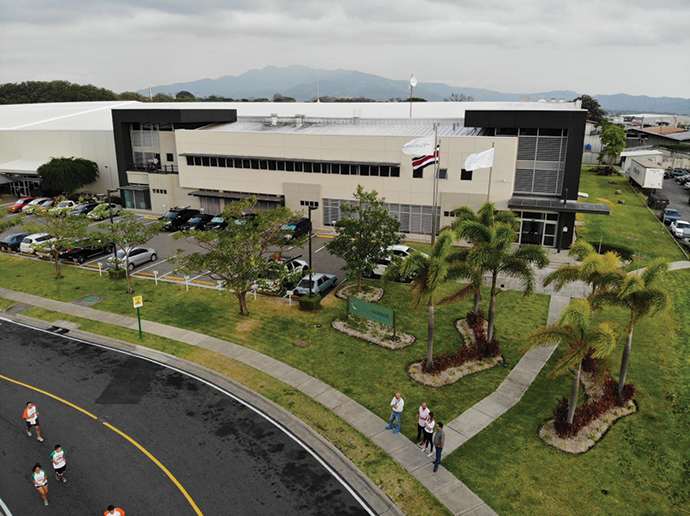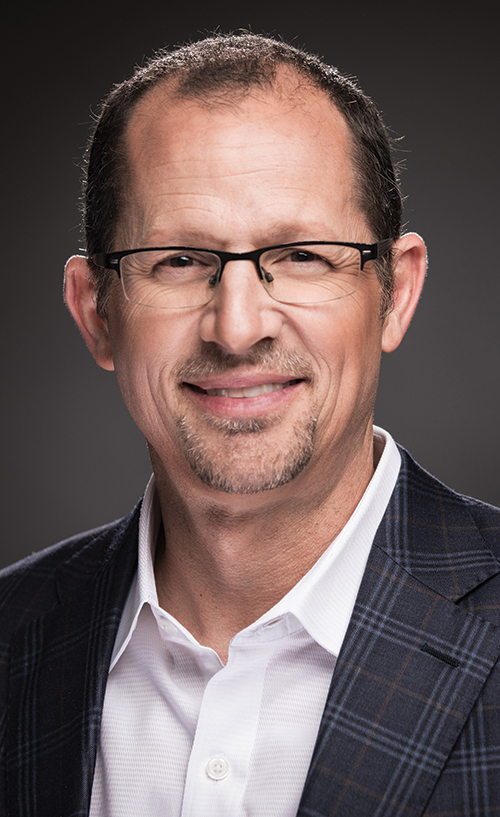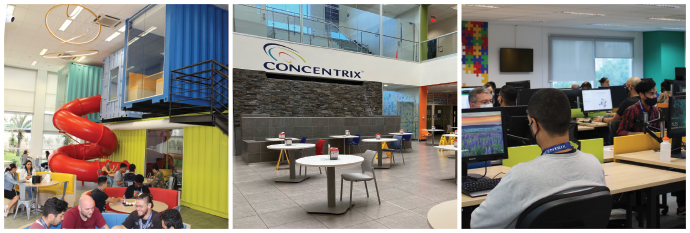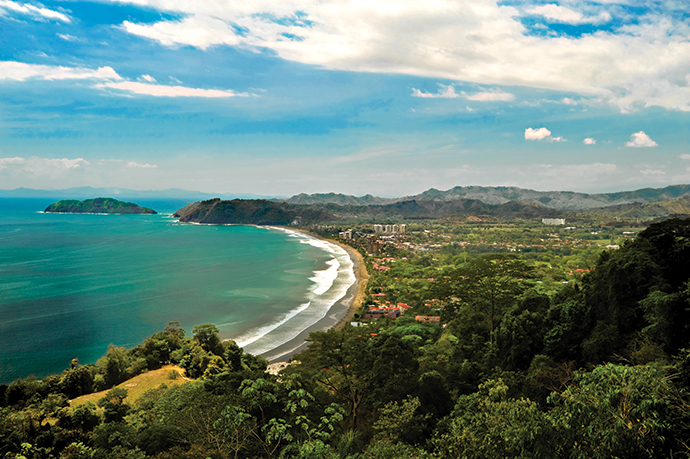When I asked Holly Sullivan, head of worldwide economic development for Amazon, about places outside the U.S. where the company was looking to ramp up growth, she listed half a dozen places in the world. Costa Rica was one of them.
“How we’re making those decisions is working backwards from the customer,” she said. “Where do we need to continue to double down on that talent opportunity and double down on innovation to exceed our customer expectations?”
Amazon is on its way to employing thousands in locations across Costa Rica, with half of management positions filled by women, and over 1,500 employees working 100% from home outside the San José metro area. It’s followed up with the news that Amazon Web Services will open a new office in San José to support the rapid adoption of cloud computing across Costa Rica.
The e-commerce giant is not alone in its desire to grow innovation and exceed customer expectations. It’s also not alone in choosing Costa Rica as a place to achieve those goals.
In its 2020 Impact Report, released this spring, CINDE — the Costa Rican Investment Promotion Agency — announced its fifth straight record year for job creation, having welcomed 19,806 new jobs from investors such as AstraZeneca, IBM and Samtec. Those jobs arrived via 81 projects, 26 of which were first-time Costa Rica investors. That means 55 repeat investors. Among the sources of job growth are Coca-Cola and Sykes in the Northern Pacific region; Firestone in Turrialba; Del Monte in the Southern Region; Panduit in the Western Region; and Yellow Pallets, Cocojo and APM Terminals in the Atlantic.
The companies’ countries of origin span the globe: Of the 26 new entries, 14 of them came from non-traditional origins representing 11 different countries such as Japan, Denmark, France, Germany, India, the UK and Bosnia and Herzegovina.
Those investors are likely to stick around and grow for a while: The 332 companies supported by CINDE have seen continuous employment growth that in 2020 reached 134,026 jobs, with more than 81,000 of them in services, and 38,248 jobs in the fast-growing life sciences sector.
“Over the years, Costa Rica has become the destination par excellence for nearshoring,” said CINDE Managing Director Jorge Sequeira, noting that manufacturing didn’t skip a beat either. “Our position was reaffirmed during the pandemic thanks to a joint public-private effort that led to an agile and efficient response to ensure business continuity. The country’s connectivity platform was put to the test and 98% of service companies showed that they were able to operate 100% remotely within a matter of days — while still enjoying the benefits of the free trade zone.” That amounted to 70,000 people working from home.
The ability to do that was helped by a modern legal framework that allowed remote work implementation across multinational companies in a record time, and increased mobile penetration reached 148% with 92% being smart phones which is above the U.S. penetration rate. Fiber optics also grew 146% between 2019 and 2020.
Costa Rica also was able to ensure business continuity and avoid business disruption. This response capability was headed by the Ministry of Foreign Trade, Procomer and CINDE through bi-weekly roundtables headed personally by the Minister together with over 26 business chambers to address challenges, provide clear information and collaborate with solutions, a true private-public focus.
“Assurance of this business continuity with a clear rule of law and openness to trade demonstrated multinationals’ trust in Costa Rica as their strategic partner for the new nearshoring,” said Eric Scharf, President of the Board of Directors at CINDE.
Multinationals obviously are buying what Costa Rica’s selling when it comes to FDI attraction. It comes full circle when you examine what the entire world is buying from the land of Pura Vida. According to PROCOMER, Costa Rica closed 2020 with more than $11.6 billion in goods exports, up 2% over 2019 for a new record, even as exports around the world dropped by 9.2%. Leading the way were an 8% jump in precision and medical equipment exports (which represented 34% of exported goods), a 7% increase in exports of corporate services and a 5% increase in ITC services exports.
Meeting Corporate SDG Goals
The nation’s success isn’t measured in numbers alone. In addition to being saluted among the Global Best to Invest investment promotion agencies in this publication for several years CINDE was also voted the world’s best IPA by the International Trade Centre’s comparative evaluation model, and received special recognition from the United Nations for mainstreaming gender in investment promotion.
Equality is one of elements within Costa Rica´s differentiation approach to investment based on “People, Planet, Prosperity” — and its impact to contribute to the corporations’ ESG goals. CINDE’s results reinforce Costa Rica’s contribution and compliance with the global Sustainable Development Goals (SDGs) established by the United Nations, and CINDE reports its results’ impact on four main SDGs: Decent Work; Gender Equality; Industry, Innovation and Infrastructure; and Quality Education.
“Costa Rica’s commitment to sustainability is our flagship to develop the right conditions for multinational companies that are looking to invest with purpose,” says Jorge Sequeira. No wonder more than 25 members of RE100, an international initiative that brings together more than 100 influential businesses committed to 100% renewable energy, have invested in Costa Rica.
In approving in March 2021 a $1.7 billion arrangement to support Costa Rica’s recovery and stabilization from the economic damage caused by the COVID-19 pandemic, the International Monetary Fund talked to Costa Rica President Carlos Alvarado Quesada about innovation and climate change mitigation being part of the country’s new economic program.
“Boosting productivity requires setting the right conditions for domestic companies to thrive, improving the regulatory framework, and reinforcing our commitment to trade and foreign direct investment, to help companies integrate in global value chains,” the president said. “Competitiveness will also be boosted by stimulating innovation, including among small and medium-sized enterprises, and by reducing infrastructure bottlenecks. We will rely on public-private partnerships to rapidly increase the quality of our road network, and we will also strengthen our digital infrastructure.”
But in Costa Rica — as many say in the U.S. — it’s human infrastructure that will prove to be the strongest girder for prosperity.
“There is an increasing demand for professionals in services, science and technology globally that academic institutions are not managing to fulfill,” the president told the IMF. “We recently approved legislation to strengthen and modernize the National Institute of Learning, so as to better prepare for the fourth industrial revolution.
It couldn’t come at a better time, as this year, on September 15, Costa Rica will celebrate the bicentennial of its independence. The recent success and forthcoming growth spotlighted in the following pages will make that celebration all the sweeter.
Adam Bruns
Managing Editor,
Site Selection magazine
Healthy Portfolio
An Array of Life Sciences Companies Find Costa Rica to be a True ‘Life-Centered’ Hub
If you’re looking for trends in inward investment by major employers, it can help to look at what’s being shipped outward.
When Costa Rican export figures for January 2021 were released, they showed healthy diversification by sector and by destination regions. They also showed continuing growth in life sciences, with precision and medical equipment accounting for 35% of all exports, and showing a 42% rise in value over the previous January. Leading the way in the growth are prosthetics for medical use, catheters and other devices.
But big pharma is engaged too: AstraZeneca recently inaugurated its new head office in Costa Rica following a US$8 million investment. The corporation announced that it would add 60 new positions in 2021, for a total of 320.
Also amidst the pandemic, Roche doubled its operation in the country to reach 700 people. The Roche team provides end-to-end integral and strategic solutions to the Roche Pharmaceutical and Diagnostic divisions all over the Americas in areas such as finance, People & Culture (previously human resources), purchasing and IT.
“It excites us a great deal to announce the expansion of our People Support Solutions area that only joined our operations in May 2020,” said Héctor Feliú, general manager of Roche Services & Solutions, at the announcement in March 2021. “We reaffirm that talent is the greatest driving force for growth that makes it possible for us to continue offering high-value-added services that are increasingly sophisticated and that make our portfolio robust. All this results in and contributes to our global purpose of improving the quality of life for patients around the world from Costa Rica.”
“We reaffirm that talent is the greatest driving force for growth that makes it possible for us to continue offering high-value-added services that are increasingly sophisticated and that make our portfolio robust.”
The jobs are not direct life sciences jobs, but they are jobs for a life sciences leader. And they’re directly about life: Roche extols the diversity and inclusion of its team, with over 17 different nationalities. Additionally, more than 20% of the employees are older than 40, and women occupy 48% of the leadership positions.
These companies’ reasons are many, but they might be best summed up by the slogan of one of the growing companies themselves, Viant: “The Perfect Combination: Big-Company Resources. Small-Company Attention.” In Costa Rica, you get big-time talent in a friendly, community-centered environment.
Massachusetts-based medical device company Viant in April announced it had completed a major expansion of its manufacturing facility in a free trade zone in Heredia, adding cleanroom molding and assembly space and repurposing other space to introduce new molding capabilities to the liquid silicone rubber molding capability added in 2020. The expansion will add up to 300 jobs in Heredia by the end of 2021.
Also in April, orthodontic medical device company Byte announced it will hire 150 more people in Costa Rica due to the growth of the local operation. That will add to a workforce of 250 that started as just four people less than two years ago in June 2019.
“Costa Rica has a very attractive talent pool in this industry,” said Pablo Rojas, general manager of Byte. “Additionally, there is an interest of people to get involved in projects based on innovation, with different work schemes, organization, opportunities and inclusion, not only for those who participate within the company, but for those who are providing a service, there is a lot of interest for learning and making a difference.”
In March, Viatris, created by the merger of Upjohn and Mylan in 2020 and now the sixth largest pharma company in the world with more than 45,000 employees, announced a $1.4 million investment to launch operations in Costa Rica at a new regional HQ.
“We are standard-bearers of public health, and Costa Rica, a country with a global and supportive health system, such as the Caja Costarricense de Seguro Social, and with first-level public health indexes, is the natural choice for a company like Viatris,” said Patrick Doyle, Viatris leader for LATAM. “As standard bearers of accessible health, collaboration and leadership, we found in your country a like-minded ally.”
Mid-market medical device contract manufacturer Biomerics in February 2021 announced the doubling of its manufacturing footprint at the Zeta Free Zone in Cartago. The expansion is via a new, 110,000-sq.-ft. (10,219-sq.-m.) greenfield plant adjacent to Biomerics current operations, and includes extrusion, injection molding, micro metal processing, and cleanroom assembly process.
Biomerics currently employs 175 people at a smaller facility focused on extrusion, laser processing, high volume assembly and packaging. The expansion is in support of active transfer programs with strategic customers and is expected to double the number of Costa Rican employees over the next three years.
“This expansion is in line with our vision to be the leading interventional contract manufacturer,” said Travis Sessions, Biomerics CEO. “Customers have requested that we build a vertically integrated operation in Costa Rica to provide cost-effective, high-volume manufacturing for the interventional market.”
MicroVention Makes Major Investment
Among the biggest investors of all, however, is U.S.-Japanese company MicroVention-Terumo, which is investing $80 million to construct a new 20,000-sq.-m. (215,285-sq.-ft.) plant in the Coyol Free Zone in Alajuela that will create 2,000 new jobs. The project is recognized by Site Selection as one of the Top International Deals of 2020.
The company, whose U.S. operations have also been expanding to a new headquarters in California, first launched operations in Costa Rica in 2012, and already employs 1,700 at two manufacturing plants dedicated to creating medical devices used in endovascular therapies for the treatment of vascular and brain diseases.
“Microvention began operations in Costa Rica more than seven years ago and has recognized the great potential of our family of workers and managers, as well as manufacturing associates,” said Charlie Noel, vice president of International Operations at MicroVention. “Our success in Costa Rica has allowed MicroVention to grow in what is our third expansion in the country. Today our strategic vision drives us to close 2022 with nearly 35,000 square meters [376,750 sq. ft.) in manufacturing areas and 3,000 employees. We are very proud to export medical products from Costa Rica all over the world, in addition to helping patients have a better quality of life.”

At the announcement, Costa Rican President Carlos Alvarado, who weeks before had held a meeting with senior officials of the company, thanked them for their confidence. After reiterating the government’s support for FDI and the Free Trade Zone regime, Alvarado saluted the great impact that a third plant and 2,000 more jobs will have on quality employment, and highlighted the inter-institutional work that has been carried out, and that will be strengthened with a new law designed to train Costa Ricans so that they have greater opportunities to enter the labor market.
Through that law, CINDE, the National Training Institute (INA) and the companies of the Costa Rican life science cluster are pursuing a joint training initiative that already provided training in strategic areas for 500 employees of medical companies, boosting their professional development and the country’s competitiveness. Employees from Allergan, Bayer, Boston Scientific, CooperVision, Edwards, Freudenberg, Moog, Nellipak, Philips and Tegra were trained in medical manufacturing, occupational health, waste management and first aid. The majority of training was provided virtually.
Digital Opportunity
That’s not the only human resources tool at companies’ disposal. Recently the Code Recruitment and Training Institute together with Coyol Free Zone founded the Coyol Academy project, a digital platform that gives people the opportunity to train on issues related to the medical industry from the comfort of their homes and with any type of device (cell phone, tablet or computer).
“Academia Coyol offers its first digital course for people who wish to opt for the position of Manufacturing Operator in Coyol Free Zone,” said Carolina Zamora, manager of After-Sales Services at Coyol Free Zone. This course will provide them with knowledge that can influence their performance and generate many successes in their hiring processes.”
The first course, “Introduction to the Medical Device Industry,” is now available at Academia Coyol, and those who complete it 100% and pass the evaluations are given the opportunity to remain in a database available to all park companies.
“The year 2020 was an extremely challenging one, and the pandemic impacted countries, companies, entrepreneurs, and all people in general,” observed Costa Rica Minister of Foreign Trade Andrés Valenciano. “However, one of the great tasks we have faced has been how to turn those threats into opportunities. Today, Coyol Free Zone shows us how to adapt to this new normal and provide opportunities for growth and training to many people. Likewise, we highlight the importance of Costa Ricans being able to continue on the path of constant and permanent learning, as well as seeking learning opportunities to enter the knowledge economy. We strongly urge people to enroll in these programs and enhance their employability possibilities through free, quality online training.”
Coyol Free Zone also is working with FUNDATEC to bring to virtuality a series of courses that will be focused on acquiring new applied knowledge in the medical industry.
Coyol Free Zone holds a strong concentration of medtech companies in Costa Rica, amounting to more than $2 billion a year, accounting for 58% of exports from the country’s entire free trade zone regime’s manufacturing sector.

Lifelong Learning is the Beating Heart of Prosperity … and Recovery
Over the course of 2020, CINDE implemented a series of educational initiatives, either as the main organizer or as a partner, geared at training the talent needed for the new knowledge economy. Among the most head-turning is a partnership announced in June 2020 with the online learning company Coursera, which provided grants for 50,000 Costa Ricans.
The partnership brought together one of the world’s most dynamic countries and a leading online learning platform for higher education that includes 62 million learners and more than 200 of the world’s top universities and industry educators.
Coursera Workforce Recovery is an initiative that seeks to help unemployed individuals by providing them with free access to 90% of the courses and certifications available on the platform. The process was carried out over the balance of 2020 through an agreement with the Costa Rican government and is part of the efforts to mitigate the impacts of COVID-19 while also providing training for Costa Ricans in the highest-demand areas for industry 4.0.
Areas of study included digital, strategic, and technical skills, including programming, cybersecurity, sustainability, blockchain, artificial intelligence, entrepreneurship, and data science, among others. There were 38,313 courses completed in 2020, and $40,200 in Coursera grants awarded, based on 50-plus learning paths CINDE designed within Coursera based on the insights and requierements that investing companies indicated. The participation rate in the Coursera program in 2020 was 46%, vs. the average usage rate worldwide of 21.3%.

“The pandemic has affected hundreds of millions of jobs around the world, including the livelihoods of many Costa Ricans,” said Jeff Maggioncalda, CEO of Coursera, last summer. “We are proud to partner with President Alvarado, CINDE, the Ministry of Labor and the Ministry of Foreign Affairs to provide displaced workers with access to job-relevant skills needed to reenter the workforce.”
“This project is the first of many we expect to carry out in collaboration with Coursera over the coming years,” said CINDE Managing Director Jorge Sequeira. “Its implementation reinforces the country’s commitment to innovate and provide a favorable climate for local and foreign investment, with a human talent trained both in digital areas and in strategic skills for employability.”
“According to the World Economic Forum, Costa Rica is the Latin American leader for human capital ratios and digital skills, which make the successful implementation of platforms like Coursera a natural fit,” said CINDE. “In addition, the country stands out for its dynamic ecosystem of multinational companies and local businesses, which together promote skill-development initiatives in their workforce, as a response to the current crisis.”
A Complete Academic Schedule
- CINDE acted as a support agency for the Innovation and Human Capital for Competitiveness Program from the Ministry of Science, Technology and Telecommunications (MICITT) in the implementation of highly specialized STEM training. To date, 2,023 applications (29% women) have been received for the bootcamp program.
- As part of its digital transformation talent strategy, CINDE also has launched a communications campaign to motivate professionals from a variety of companies to acquire and develop new skills in high-demand areas of the economy. There are currently 1,300 people enrolled in training.
- In partnership with Fundación Gente, over 10,500 people received training on issues relating to administration, technology and education, vocational orientation and project management. Participants included board members, school principals and teachers from throughout the country.
- A review of Ministry of Public Education (MEP) curriculum in professional vocational high schools validated curriculum updates for industry 4.0 in the areas of technical specialties in network technology and software. The work was performed by MEP, Fundación Omar Dengo, CINDE and the private sector, and a new technical specialization in cybersecurity was created. “In addition, an information collecting exercise is planned to identify the abilities, knowledge and skills that employers require from graduates,” says CINDE, “which will help in updating and validating study plans and technical specializations. These processes seek to ensure that students enter the workforce with an academic training that meets the latest industry requirements.”
- The Smart Mentors program, a corporate volunteer program, has engaged 144 volunteers benefiting 3,673 students.
- Meanwhile, the Association for the Advancement of Medical Instrumentation (AAMI) partnered with CINDE to provide training to the country’s rapidly expanding medical device manufacturers.
- The Gender, Education and Technology (GET) program was created with the goal of promoting careers in STEAM and women’s involvement in the knowledge economy. As part of the program, Arizona State University (ASU), in collaboration with CINDE and its member multinational companies based in Costa Rica, has worked to coordinate the project Women in Engineering Projects in Community Service (WEPICS). This initiative seeks to inspire high school students to pursue careers in STEAM through an innovative project-based study plan in which they are challenged to solve real-world problems in their communities using science and engineering.
The Time-Place Contiuum: Costa Rica Operations Help Companies Outrun the Sun

For year, multinationals have strategically located sites in places designed to serve internal and external customers effectively in real time, and pass things off to another time zone as the planet rotated into the next region’s work day.
It was called following the sun. But when you find a strong location with the right people and infrastructure, why pass things along at all?
Costa Rica today is home to over 81,000 jobs in the knowledge-intensive services sector. The country has seen $4.9 billion growth in export of knowledge-intensive services, with 98% of companies using work-from-home systems.
The country was welcoming remote work and hybrid work arrangements long before a pandemic force the world’s hand to do the same. It was also welcoming a diverse array of industry sectors, which has proved fruitful in its own right.
600% Growth, More On the Way
In a March 2021 webinar on near-shoring, Leonardo Framil, market unit lead, LATAM, for Accenture, spoke of the company’s first arrival in the country via an acquisition in 2012, when a single site had 300 people, mostly offering graphic design and web marketing services.
“After nine years, we have increased our headcount more than 600%,” he said, noting there was no other country in Accenture’s network that’s seen growth like that. Moreover, he said, the company has 300 open positions, and expected to be at the 2,500 mark by the end of March and 3,000 people by the end of 2021. The site will be positioned soon as Accenture’s third largest Latin America operation behind only Brazil and Argentina and ahead of Mexico, Chile and Colombia.
“I think there is a clear demonstration of our clients’ interest in near-shoring alternatives,” Framil said, noting more than 150 mostly virtual client visits to the Costa Rica site, which now serves more than 50 world-class corporate clients around the globe. The digital transformation of business is one overarching reason for the prodigious growth, he said, but “in the case of Costa Rica no doubt it is completely related to the quality of the human capital that allowed us through a continuous innovation mindset to evolve our operation” from traditionally starter-level services to transformational and value-added services in marketing campaigns and digital finance, among other fields.
“Central Costa Rica became a global digital production center of excellence,” he said, “and we are even more bullish about the future” as the rest of the world rushes to catch up.
In March, San Francisco Bay Area-based software company Autodesk announced the opening of a new Autodesk office for the Latin America region based in San Jose, Costa Rica. The new hub’s inside sales professionals and other teams will drive growth across Latin America. “We selected Costa Rica for our Latin America hub because of its global business environment and talent pool, ability to support multiple Americas languages, and its vibrant multicultural capital which offers a great quality of life for our employees,” said Morgan Kirkland, senior director of inside sales and site leader for the Americas, when the office opened.
Reached by email in April, Kirkland told me, “The Costa Rica sales initiative is a key priority for the Americas sales strategy. While a number of LATAM metropolitan markets were considered in the evaluation, Costa Rica has a proven track record supporting inside sales operations for both for LATAM and U.S. businesses. Ultimately, San José is a safe city with attractive labor costs and a strong higher education system that will expedite sales growth in the aforementioned markets.”
Asked how workforce in particular was evaluated, he said, “A number of considerations were evaluated in the assessment of skills-based talent. These attributes spanned across labor costs, access to public transportation, competitor presence and density of higher education.”
Costa Rica’s savvy in knowing how to manage remote work was an advantage too.
“Autodesk is the midst of deploying a formalized hybrid approach,” Kirkland said. “However, the pandemic accelerated this process. The deployment of our Costa Rica sales operations allowed us to effectively recruit, hire, and retain talent during a time when many companies could not.”
Finally, I asked him what he knows about Costa Rica now that he didn’t know before. He just had one thing to say:
“The Costa Rica way of life,” he said. “Pura Vida.”
Concentrix Likes Costa Rica Concentration of Talent
In March 2021, customer experience (CX) technology and solutions provider Concentrix, which first landed in Costa Rica in 2005, announced it was creating 1,000 new jobs this spring in sales and tech support, as well as filling numerous professional and executive positions from operations managers to support engineers.
“Costa Rica is consolidating itself as a strategic site for us, so in 2021 we will be on a constant lookout for staff in several cities,” said Juan Pablo Guzmán, country leader for Concentrix. “The level of job commitment and the quality customer service we found in this country led us to reinforce the local operation. We decided, at a critical moment in employment, to offer concrete solutions for reactivating the economy and open up jobs with the best market conditions.”
As additional support for those wishing to work for Concentrix, the company has designed ILab, a program that helps candidates gain confidence in the use of English, giving them the possibility of being hired for bilingual accounts. The initiative, launched in November 2019 at no cost to students, has already graduated 90 people, of which 68% have started to work at Concentrix.
I recently conducted this Q&A with Manfred Kissling, group vice president and GM for Latin America & Caribbean for Concentrix:
What is it about your Costa Rican operations that compares favorably vs. some of the other countries in which you do business?
Manfred Kissling: Costa Rica is a strategic location for us. It is a country with a long democratic tradition, a high level of education, safety and very well connected with the world, both digital and physical, and offers a wealth of talented, experienced people and leaders. It is home to some of the most important global clients Concentrix has. With the uncertainty in the world due to protectionism, safety, and health matters, over the last two years the value proposition of the country has become even stronger, allowing us to grow at the fastest pace we have for years. The strong management of the COVID pandemic in the country allowed us to keep our people and clients safe and happy. It was a great example and one of the reasons we plan to keep on investing in a country that invests in its people.
We noted a 1,300-job expansion in late 2020, and now there is another 1,000-job expansion that mentions multiple cities in which you want to grow your headcount. Which cities are you looking to develop the most?
Manfred Kissling: Currently we have operations in Heredia and San Jose, and we plan to keep on growing in these locations. We also have plans to leverage our proprietary Home Office Technology to grow permanent Work-At-Home in a safe and efficient way. With this and the quality of infrastructure and education across the whole country, our plan is to grow beyond the greater metro areas, bringing opportunities to people in different communities throughout the country.
Tell me how the ILab program was created. Is this the type of innovation that global Concentrix might deploy at its other sites around the world?
Manfred Kissling: It’s in Concentrix’s DNA to be fanatical about our customers and staff. iLAB is a program created to invest in our future Costa Rican staff. The program allows people to polish their English to improve their skills, feel better about their competence and make customers happier. It’s a win-win-win proposition for us. Our people win because we help them polish a very important skill for life, Concentrix wins because it’s one more action to show our people we walk the talk, and our clients win as we continually improve their customers’ experiences. It’s consistent with our plan to grow our business in the country. The program is already implemented in Costa Rica and Colombia. Our plan now is to expand across other countries in Latin America based on the success we have had.
What do other multinationals need to know about Costa Rica’s competitive advantages that they might not know?
Manfred Kissling: Let me share an anecdote. Between 2003 and 2005 I was Director of PROCOMER. That is the government institution responsible for managing the Free Trade Zones and helping build capacity in local companies to compete in world markets. Back then the services industry was much smaller, however the questions were the same. Well, after nearly 20 years, the country has multiplied the industry 10-fold. The reason for this success relies on the education system, the access of people to the digital world and the close ties between the Costa Rica and U.S. economies.
Intel Still Feels at Home
Among the pioneers in near-shoring in Costa Rica was Intel, whose portfolio over the years has evolved to now employ more than 2,200 people at two large centers of excellence: the country’s largest R&D center and Intel´s only Megalab of its kind outside the USA; and a global services center that performs multifunctional business processes supporting finance, human resources, sales and marketing, quality and IT across the globe.
Now a new chapter is set to begin. The company announced in December 2020 it will invest $350 million over three years to start assembly and test operations in Costa Rica. The investment is anticipated to create more than 200 new jobs in the coming months, and the facility will begin to operate in the second half of 2021 at the company’s campus in Heredia. It can’t come soon enough in a world now facing a semiconductor shortage.
“Intel continually evaluates its operations around the world to ensure that we have the right capacity to supply global demand,” said Ileana Rojas, general manager of Intel Costa Rica, at the December announcement. “We will start the assembly and test facilities in Costa Rica to expand our global capacity so we can continue fulfilling Intel customer’s needs. The existing infrastructure, synergy with the test operations that already exist on-site, the talent, the free trade zone regime, and legal environment gave Intel a favorable option to start its assembly capacity in Costa Rica.”
“With the uncertainty in the world due to protectionism, safety, and health matters, over the last two years the value proposition of Costa Rica has become even stronger, allowing us to grow at the fastest pace we have for years.”
“For Costa Rica, Intel symbolizes a pioneer in the high-tech industry that opened the door for many companies to establish in our country, similarly attracted by the talent of our people, our most valuable asset,” said Costa Rica Minister of Foreign Trade Andrés Valenciano. With a history of constant transformation that today translates into a diverse range of processes, the local facility is well-positioned to service the global marketplace competitively, with elevated resilience and value-added. Such high-level performance is particularly important in a challenging context driven by Industry 4.0, and further accelerated by the COVID pandemic.”
Timothy Scott Hall, manager of government affairs and public relations at Intel Costa Rica, tells me resilience and adaptability are key characteristics of Costa Rican talent.
“Those features have allowed Intel several positive transitions, starting with manufacturing, moving to value-added services, a design center and now, having the previous three, adding manufacturing again,” he says. “Our main ingredient has been the Costa Rican human talent that has been able to adapt and be resilient during these stages.”
Asked how the company is able to continue growing talent when so many other companies are also expanding there, he says simply, “Intel is the best place to work. We have a close relationship with universities in the country and have a very attractive total compensation system.” But collaboration is abundant too. “There are collaborative schemes, where our direct work and others through CINDE allow the private sector to unify efforts to increase the quantity and quality of human talent required by companies,” he says. “We must continue to work in that direction, because of the growth that the local ecosystem has had.”
Meanwhile, the natural ecosystem is as strong as the metaphorical one, and offers another example of Intel and Costa Rica as a pioneering pair: The Costa Rica site is Intel’s first Carbon Neutral certified operation in the corporation. “Intel Corporation has Corporate Social Responsibility as an intrinsic component of the way of doing business, and we see that as a whole, not in a particular way in each of the places where we operate,” explains Hall. “That is why we launched the RISE 2030 goals [Responsible, Inclusive, Sustainable and Enabling]. These are global goals, which will allow us to remain a responsible corporate citizen.”
The message to multinationals? A near-shoring strategy motivated by redundancy and flexibility may quickly evolve to a multifaceted global leadership role when the location is in Costa Rica.
This Investment Report was prepared under the auspices of CINDE, the Costa Rican Investment Promotion Agency. For more information, visit the new CINDE website at cinde.org.


